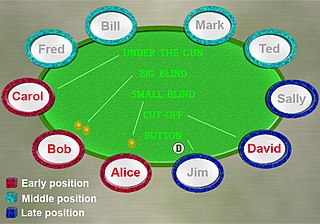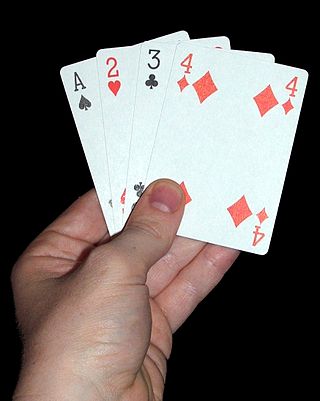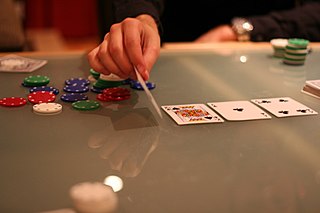
Poker is a family of comparing card games in which players wager over which hand is best according to that specific game's rules. It is played worldwide, however in some places the rules may vary. While the earliest known form of the game was played with just 20 cards, today it is usually played with a standard deck, although in countries where short packs are common, it may be played with 32, 40 or 48 cards. Thus poker games vary in deck configuration, the number of cards in play, the number dealt face up or face down, and the number shared by all players, but all have rules that involve one or more rounds of betting.
In traditional poker games, the player with the best traditional hand wins the whole pot. Lowball variations award the pot to the lowest hand, by any of several methods. High-low split games are those in which the pot is divided between the player with the best traditional hand and the player with the low hand.
There are several actions in poker called declaration, in which a player formally expresses his intent to take some action . For example, one may verbally declare an action while in turn, which obligates the player to complete that action. One may declare a number of cards to draw in a draw poker game, or one may declare some other choice specific to the variant being played.
In poker, pot odds are the ratio of the current size of the pot to the cost of a contemplated call. Pot odds are compared to the odds of winning a hand with a future card in order to estimate the call's expected value. The purpose of this is to statistically guide a player's decision between the options of call or fold. Raising is an alternative to place this decision on the opponent.

Omaha hold 'em is a community card poker game similar to Texas hold 'em, where each player is dealt four cards and must make their best hand using exactly two of them, plus exactly three of the five community cards. The exact origin of the game is unknown, but casino executive Robert Turner first brought Omaha into a casino setting when he introduced the game to Bill Boyd, who offered it as a game at the Las Vegas Golden Nugget Casino. Omaha uses a 52-card French deck. Omaha hold 'em 8-or-better is the "O" game featured in H.O.R.S.E.

In the game of poker, the play largely centers on the act of betting, and as such, a protocol has been developed to speed up play, lessen confusion, and increase security while playing. Different games are played using different types of bets, and small variations in etiquette exist between cardrooms, but for the most part the following rules and protocol are observed by the majority of poker players.
Five-card stud is the earliest form of the card game stud poker, originating during the American Civil War, but is less commonly played today than many other more popular poker games. It is still a popular game in parts of the world, especially in Finland where a specific variant of five-card stud called Sökö is played. The word sökö is also used for checking in Finland.
In poker, the probability of each type of 5-card hand can be computed by calculating the proportion of hands of that type among all possible hands.
Lowball or low poker is a variant of poker in which the normal ranking of hands is inverted. Several variations of lowball poker exist, differing in whether aces are treated as high cards or low cards, and whether straights and flushes are used.
Seven Twenty-Seven is the name given a variety of Vying games similar in some respects to poker, and often played as a "dealer's choice" variant at home poker games. It uses the same cards, chips and betting system as poker, but the value of hands does not use traditional poker hand rankings, either high or low. Rather, the worth of a hand depends on only the sum of the values of the cards accepted, as in 9½-29½, or 21, a/k/a Black Jack, the modern casino game which developed from this contract via Trente-et-Un and Vingt-et-Un, its seventeenth century predecessors.
Razz is a form of stud poker that is normally played for ace-to-five low. It is one of the oldest forms of poker, and has been played since the start of the 20th century. It emerged around the time people started using the 52-card deck instead of 20 for poker.

Badugi is a draw poker variant similar to triple draw, with hand-values similar to lowball. The betting structure and overall play of the game is identical to a standard poker game using blinds, but, unlike traditional poker which involves a minimum of five cards, players' hands contain only four cards at any one time. During each of three drawing rounds, players can trade zero to four cards from their hands for new ones from the deck, in an attempt to form the best badugi hand and win the pot. Badugi is often a gambling game, with the object being to win money in the form of pots. The winner of the pot is the person with the best badugi hand at the conclusion of play. Badugi is played in cardrooms around the world, as well as online, in rooms such as PokerStars. Although it doesn't have its own tournament per se at the WSOP, it is featured in the Dealers Choice events as well as in the Triple Draw Mix.
Teen patti is a gambling card game that originated in the Indian subcontinent and is popular throughout South Asia. It originated in the English game of three-card brag, with influences from poker. It is also called flush or flash in some areas.
Guts is a comparing card game, or family of card games, related to poker. Guts is a gambling game involving a series of deals of 2, 3, or 4 cards. Hand are ranked similarly to hands in poker. The betting during each deal is simple : all players decide whether they are "in" or "out", and announce this at the same time. Each deal has its own showdown, after which the losers match or increase the pot, which grows rapidly. A round of the game ends when only one person stays in and wins the pot.
The following is a glossary of poker terms used in the card game of poker. It supplements the glossary of card game terms. Besides the terms listed here, there are thousands of common and uncommon poker slang terms. This is not intended to be a formal dictionary; precise usage details and multiple closely related senses are omitted here in favor of concise treatment of the basics.
Stud poker is any of a number of poker variants in which each player receives a mix of face-down and face-up cards dealt in multiple betting rounds. Stud games are also typically non-positional games, meaning that the player who bets first on each round may change from round to round. The cards dealt face down to each individual player are called hole cards, which gave rise to the common English expression ace in the hole for any hidden advantage.
Draw poker is any poker variant in which each player is dealt a complete hand before the first betting round, and then develops the hand for later rounds by replacing, or "drawing", cards.

Community card poker refers to any game of poker that uses community cards, which are cards dealt face up in the center of the table and shared by all players. In these games, each player is dealt an incomplete hand face down, which are then combined with the community cards to make a complete hand. The set of community cards is called the "board", and may be dealt in a simple line or arranged in a special pattern. Rules of each game determine how they may be combined with each player's private hand. The most popular community card game today is Texas hold 'em, originating sometime in the 1920s.

Mistigri, historically Pamphile, is an old, French, trick-taking card game for three or four players that has elements reminiscent of poker. It is a member of the Rams family of games and, although it is a gambling game, often played for small stakes, it is also suitable as a party game or as a family game with children from the age of 12 upwards.